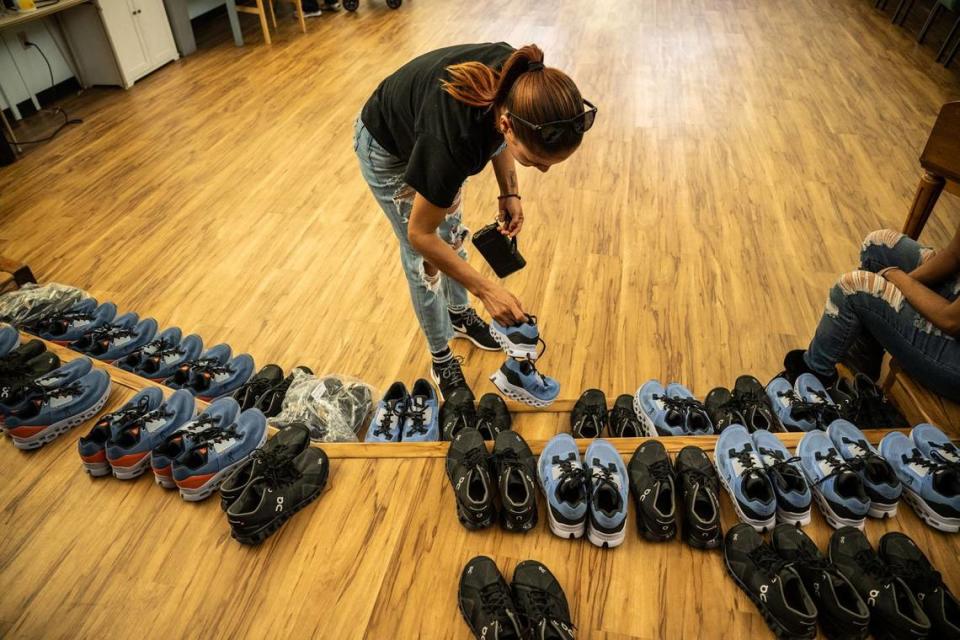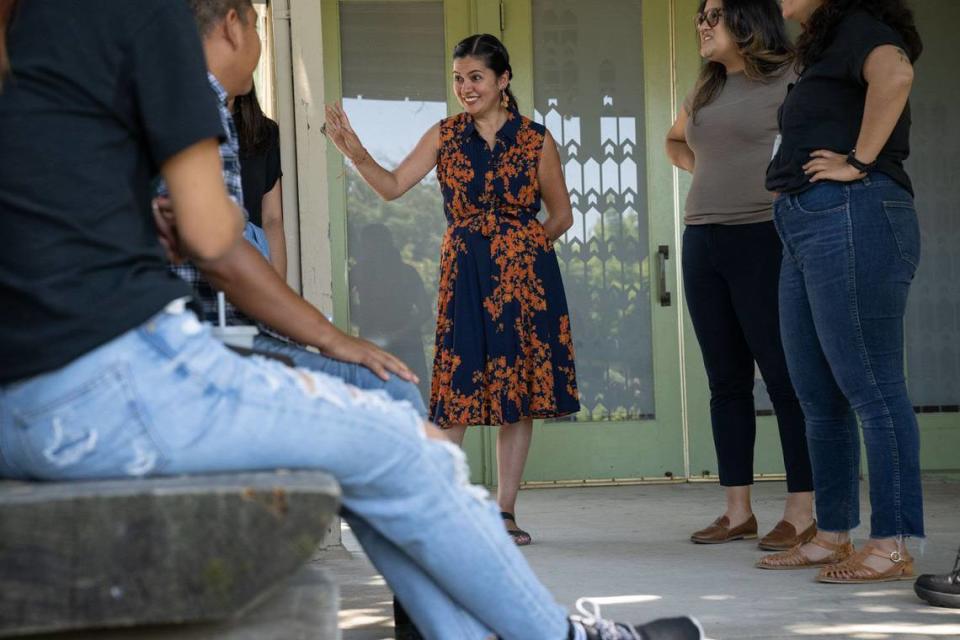Migrants speak out about journey to Sacramento, ‘trickery’ before flight paid for by Florida
Their journey to Sacramento began with different emotions.
Some embarked smiling, hoping for an opportunity for housing and work. Others wrestled with skepticism — with at least one not willing to sign a consent form handed to them hours before they were moved out of a Super 8 hotel in Deming, New Mexico.
But within minutes of arriving at their unknown destination, nearly all of the 36 migrants were in agreement: “It was all a lie and trickery.”
Two weeks after the state of Florida chartered two planes to take the Latin American migrants to Sacramento, many of the individuals aboard the flights are still questioning the reasons why.
On Friday, The Sacramento Bee spoke to four of the migrants — all from Venezuela. They shared several similarities in their stories, while also expressing hope for the possibility of a future life in Sacramento.
The migrants spoke on the condition of anonymity, fearing violence and other reprisals for their presence in the capital region.
All four left behind family and immigrated to the U.S. with hopes for a better life. They each survived a treacherous, monthslong journey to get here.
Seeking asylum, they eventually found solace and work in El Paso, Texas, before being approached outside a migrant center by individuals who promised housing, jobs and immigration services.
One of the migrants recalled one of the individuals as a woman named “Miranda.”
The migrants were then driven about 100 miles to Deming, New Mexico, where the majority signed consent forms to participate in a voluntary transportation program funded by the state of Florida at the direction of Gov. Ron DeSantis and contracted by Vertol Systems Co. Florida officials have taken responsibility for the flights, arguing the migrants signed these waivers and went willingly.
Three of the migrants said they did not comprehend the consent forms because they were in English. The fourth provided The Bee with English and Spanish versions of the document, saying he did not sign it despite pressure tactics from the organizers.
All four went on to board the Sacramento-bound flights, which took place on June 2 and June 5.
California’s Attorney General Rob Bonta issued public records requests Wednesday to DeSantis’ office, as well as the Florida Division of Emergency Management, to continue to investigate the flights.
None of the migrants said on Friday that they knew Sacramento was the intended destination, nor had they even heard of the city before arriving. Some were told they would be sent to Los Angeles.
Each of them said they felt deceived.
“I don’t see it as just because we are human beings,” said one of the men, a 34-year-old Venezuelan national. “Human beings should be given consideration.”

Fleeing their country
The four migrants fleeing Venezuela left for varying reasons.
One of the migrants, who is 40, made the trek in hopes of securing a higher-paying job to support his 11 children. In his home country, he earned about $20 a day.
“My goal has always been to find work to provide for my family,” he said, speaking in Spanish. “I don’t want my children to suffer.”
He described the journey as strenuous, particularly seeing dozens of dead bodies while traveling the Darien Gap, Panama’s treacherous jungle isthmus. Some days, the man recalled, he had to choose between eating or affording a bus ride. Other days, people helped him along his journey by offering money or food.
The entire journey took 62 days. He said that included two deportations, a kidnapping in Mexico and the death of two friends.
“The dream ended for them there,” he said.
Another migrant, a 33-year-old man, made the journey alongside his wife, leaving behind their 9-year-old son with a grandmother. They feared the boy would not survive if he came with them.
He said the couple immigrated because there was an order for his capture by the Venezuelan government for “political reasons.”
Their trek lasted roughly 45 days. He described multiple instances of going days without eating, at one point losing 40 pounds in a 15-day span. He and his wife also got separated for a few weeks before finally reuniting in El Paso.
The Venezuelan couple had been working in town for seven days when they were approached by four people — one of them named “Miranda.”
“My first thought was to accept help, being true or not,” he said.
They were able to board the flight together.

Arriving in Sacramento
Since landing in Sacramento, the four migrants have quickly become aware of the media attention and political discourse surrounding their circumstances.
They couldn’t care less.
“We aren’t involved in any politics here,” said the 34-year-old Venezuelan migrant. “We are immigrants. We don’t know anything here, from how to take a train or get an Uber.
“You think we know politics?” he said Friday in a moment of frustration, recalling the ordeal.
But frustration has turned to action, the migrants said.
They’ve turned their attention to finding work, the main reason they traveled thousands of miles. At the moment, none can work due to their immigration status. All four have pending immigration court cases across the country.
A coalition of state and Sacramento County leaders and religious groups such as Sacramento ACT have helped connect the migrants with immigration legal assistance to resolve their cases without delay. They are also providing shelter and food.
But on Wednesday, more than four dozen immigrant rights groups sent a letter to Bonta, urging him to help the 36 migrants secure U visas to remain in the U.S. This status would allow for work permits, among other opportunities.
Only 31 migrants remain in Sacramento, with five being picked up by family and friends.
The four migrants who spoke to The Bee said they have no preferences for work, and would be open to any job that allows them to start making a living. They appreciate the help from the organizations assisting them since their arrival but look forward to when they can support themselves.
“The only benefit of this situation is that we ended up in good hands. ... But you think we went through all that suffering to not work?”

